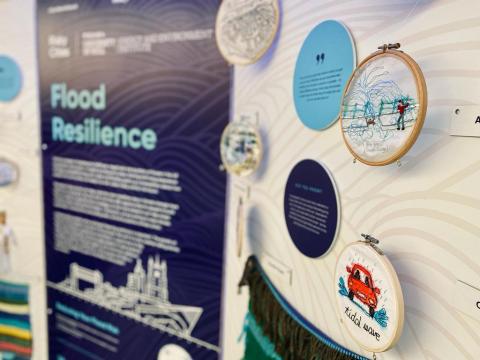A Showcase event demonstrating outputs from the UK Climate Resilience Programme was held on 10-11 October 2022 in Hull (see this news story). The final session of the two-day event aimed to distil reflections from attendees on the key Showcase themes. Group conversations followed by a panel discussion helped identify key messages, which have been written up by UKCR Co-Champion Dr Kate Lonsdale and Impact Translation Fellow Pete Walton.
Different disciplines can work together
Many conversations in the Showcase highlighted how climate change is linked across disciplines, whilst demonstrating how disciplines in the climate resilience space can work together. It also stressed, given the urgency, that they now need to work together, and also bring the intended beneficiaries into the research process where possible. The challenge of how to do this effectively remains.
Old framings are not always helpful
It is clear that some old framings, such as “knowledge users” and “knowledge providers” are not always appropriate when it comes to climate service development and provision. The Showcase provided examples of how co-production, with communities and local government, can achieve sustainable climate resilience by bringing together the arts and the sciences. Siloed thinking still exists but can be broken down by taking problem-focused or decision-focused approaches that transcend what any one discipline can offer.
Local engagement is essential
Projects working at the community level demonstrated that good local engagement is essential to achieve the place-based understanding needed to provide location-specific tailoring of responses for successful adaptation. Through considering a wider range of perspectives we can gain a full picture of what is valued and needs protecting in that location. By engaging with existing community strengths and expertise, it is possible to encourage feelings of hope and “can do” rather than despair or apathy.
There is power in play
As well as arts-based practices, serious games and role playing can be used to provide valuable safe spaces to bring people together to talk about climate change. As Palmer (2009) notes about games, “artists can scream; scientists can’t”. Games can facilitate “difficult conversations” between agencies and communities about behaviours, activities and interventions – including about what might be lost.
The Showcase highlighted the important role of storytelling, performance, games and other forms of serious play in helping people to make sense of information about climate risk and identify tangible, meaningful responses. Graphs and charts are too often a go-to mode of communication of future climate risks but they can alienate people, preventing them from fully engaging with the problem. However, care is needed to ensure scientific messages are not skewed or dumbed down in these processes. Trust in scientific information is a vital aspect of the communication process.
We need to challenge the hierarchy of knowledge
The Showcase challenged the established assumption that scientific and technical knowledge should carry more weight than other forms of knowledge. Other “ways of knowing” are clearly credible and required for resilience building at every level. Arts-based practices are particularly effective in communicating uncertainty in a more inclusive way to communities who may find it difficult to relate to a traditional scientific presentation.
The need to remain “true to the science” can prevent the climate risk messages from being communicated in ways that can be easily understood and applied. Whilst there are occasions when attention to scientific nuance is important, having a clearer sense of the decision-making context in which the risk information is applied makes more relevant meaningful communication possible.
Have realistic expectations of organisations adapting to climate change
Many organisations are still at the early scoping stages of their adaptation journey and do not yet need highly sophisticated climate risk information. Often there is an over-estimation of organisational capability and capacity to use available information to make robust decisions. The Showcase highlighted the need for greater acknowledgment of organisations’ situations and their capacity to adapt, and the need to clearly establish who takes responsibility for developing adaptation strategies and plans. Without this, the burden of responsibility often gets passed to those without the capacity, know how, budget and authority to take meaningful action.
It is ok to be challenged
The Showcase demonstrated that being provocative can help people to challenge their own position and appreciate others’ perspectives. Given the complexity of climate adaptation, any one position is inevitably partial, and we need to work with others to identify meaningful improvements. Opportunities to safely experience challenge is a useful way to support shifts in an individual’s understanding of a situation and develop an appreciation that there are other ways of knowing that have value and need to be considered. Clearly this must be done with care, support and skill as challenging someone’s ways of seeing a situation, though important, may not be comfortable. Offering possible solutions to challenging situations can be helpful in supporting a person’s difficulty in understanding a constructive way forward.
There are skills gaps to be filled
The Showcase demonstrated that the sense-making skills needed to accelerate adaptation action are largely relational. This could include facilitating conversations between groups, working with others to co-produce science, reframing problems to be context-first (rather than science-first) and relevant to that scale, and holding safe spaces for reflection and challenge, whilst recognising that the science still has a fundamental role to play in the process. These skills need to be more highly valued and could be included in postgraduate training and academic career progression. Arts and social science-based practices provide effective ways to develop such skill sets.
Main image: ‘Follow the Thread’ exhibition by the Risky Cities team (photo by Catherine Homoky)
See also Adam Walmesley’s blog on the UKCR Showcase, Exploring place-based approaches to climate adaptation

